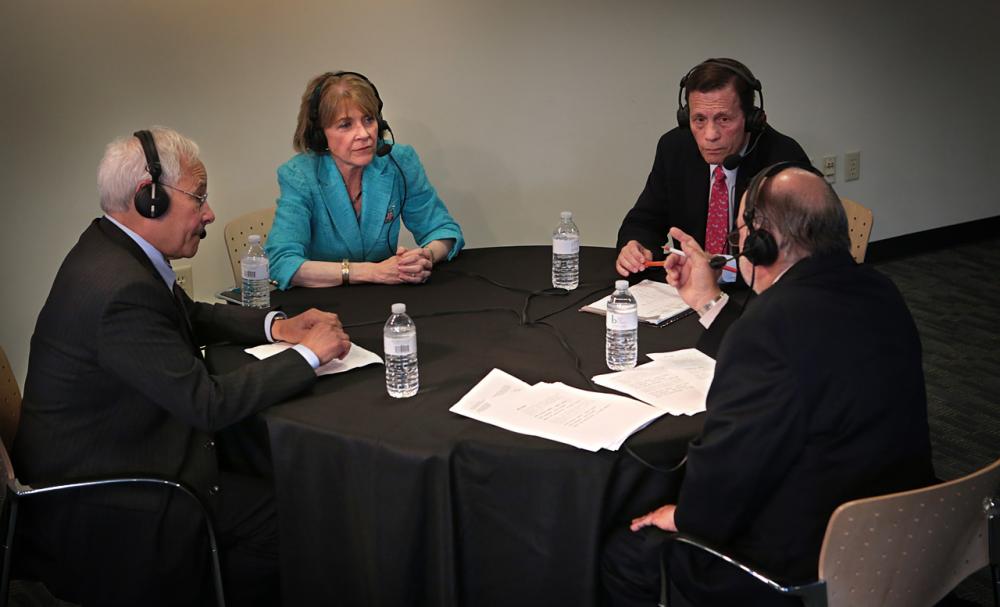The primary elections for Massachusetts governor are less than a week away. On the Democratic side, there are few stark policy differences among the contenders. But there are some small differences for voters to consider.
As candidates do, the Democrats running for governor try to stress their differences.
“And I just don’t understand, Martha…” state Treasurer Steve Grossman said.
“I guess I don’t understand why you don’t understand, Steve…” Attorney General Martha Coakley said.
“And I definitely oppose what the treasurer is in favor of…” former Obama Administration health official Don Berwick said.
“Yeah, I disagree with that,” Coakley said. “I think…”
“I think you’ve demonstrated bad judgement…” Grossman said.
It’s clear that Don Berwick is the most liberal candidate in the race, especially with his opposition to casinos and support for single-payer healthcare. But he is trailing in the polls, well behind Steve Grossman, who’s playing catch-up to Martha Coakley. And on the issues, those two are really very similar. But there are a few policy differences.
Gun purchase limit
At the end of July, a pro-Grossman super PAC launched a television ad. It featured grieving mothers holding up photos of their dead sons, all killed because of gun violence. The ad blames Coakley for not supporting a law proposed by Governor Deval Patrick limiting gun purchases to one a month.
“We all agree with governor Patrick who wants to limit gun purchases to one gun per month,” Clarissa Turner said in the ad. “Steve Grossman supports it. But Martha Coakley opposes it.”
The plan was intended to prevent gun traffickers from buying multiple guns in one transaction. Grossman says he supports it. As does Berwick. Coakley does not.
But she’s not alone in thinking “one gun per month” wouldn’t do much. David Hemenway is a Harvard Economist and member of the task force that helped update Massachusetts’ gun laws.
“Who needs one gun per month laws are states which export crime guns and that is not Massachusetts,” Hemenway said. “We are an importer of crime guns.”
Coakley does support most other gun control measures, stances that earned her an F from the NRA.
Licenses for undocumented immigrants
Another area where Grossman is trying to insert a wedge between himself and Coakley is on drivers licenses for undocumented immigrants.
While Berwick and Grossman say they’ve been in favor of the proposal from the start, Martha Coakley says her position has evolved over time. Initially she was opposed to issuing licenses, but now is “open” to issuing them.
“I’ve said that I would appoint a director of immigrant and community safety to help me deal with what we’re doing in Massachusetts, our federal partners, and looking at how we deal with these issues that other states have dealt with,” Coakley said.
That answer, in a WWLP debate last week, earned this response from Grossman:
“The best you’ve been able to say, Martha, is that you support potential access to drivers licenses,” Grossman said. ” support licenses for all immigrants as a public safety issue.”
Across the country, 11 states – including Vermont and Connecticut – allow undocumented immigrants to get some form of drivers licenses. In Massachusetts, Governor Patrick has said he has always supported drivers licenses, but a bill never emerged from the legislature for him to sign, and he didn’t made it a priority.
Throwing the dice
And then there’s what appears to be the big headline-grabber of this election season: casinos. Berwick is the only Democratic candidate for governor passionately opposed to casinos.
“I’m against casinos as my opponents are not,” Berwick said in a WBUR debate. “I think they will harm the commonwealth with mental health issues, substance abuse, gambling addiction and they’ll hurt small business.”
Grossman has been an enthusiastic supporter of casinos and opposes the effort to repeal the law. He has said that casinos will bring thousands of jobs to the state.
“I fundamentally supported the expansion of gambling in Massachusetts for two reasons,” Grossman said. “One: 15,000 jobs at a time when 250,000 people are out of work. And two: $300 million of additional revenue, according to the Mass. Taxpayers Foundation.”
Casino opponents argue these numbers are old and underestimate the costs of gambling related problems.
And Coakley, like on a few issues, is trying to chart a middle course. On many occasions, she reminds voters, “It’s not the first place I would have gone for economic development and I know there are issues…”
But she thinks the casino law should stand and will vote against repeal.
So, those are a few of the issues the Democrats hoping for the state’s top job disagree on. The list of issues they agree on is much much longer. And that’s why this primary election will likely be decided on experience, personality, leadership, and – oh, yeah – name recognition and maybe even TV ads.
